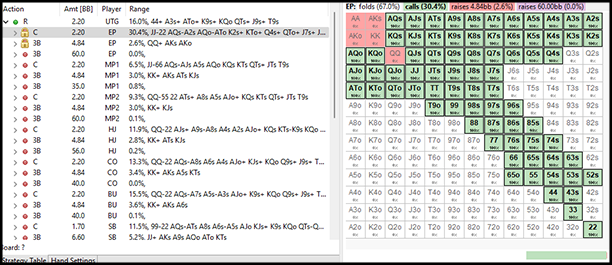My son just told me recently that in his tavern league game there is a ton of donk betting going on. It’s almost the norm rather than the exception. I wish I lived near his town.
Back in the day, donk bettors were easy to play against in Texas hold’em. Donk bets were made by novice players, simply playing the strength of their hands. This is a really face-up play. If you have a strong hand, why not check and give your opponents a chance to bet? Donk bets got their name from donkeys, which is poker jargon for really bad players.

Today the normal flow of the game is for the player who defended his blind to always check, allowing the preflop raiser to possibly make a continuation bet (C-bet) so he can profit more from his strong hands. In fact, some players check dark, meaning they make a binding announcement of their intention to check even before the flop cards appear. Donking is so unusual that it confuses other players. This is because there are a number of things that motivate this behavior, and the exploits for it can be contradictory.
But in poker information is the key. Money tends to flow from players with more information to those with less information. Donk bettors serve up this precious commodity on a silver platter. It’s can be a gold mine for you, if you know how to extract the wealth from it.
Careful observation in and out of hands is the key. Hopefully a hand you are not involved in will show you what kind of donk bettor you have. If you’re the first one, you can extract that information for yourself with a play I’ll share later in this article. I’ll list the different types of donk bets here:
Ace Donk
An ace has hit the flop. The donk bettor is bluffing, representing an ace that he doesn’t have. He knows that the open raiser probably doesn’t have one either. If the open raiser defends, the donk bettor gives up on the hand.
In future hands, this player will more likely actually have an ace if he checks his blind on an ace flop. You can exploitatively C-bet small on those future hands on all but the most dangerous flops. If he calls, you know he has an ace and you can play accordingly on the runout. If you also have an ace, you probably have him outkicked, which is a money maker for you.
Next time the Ace Donk donks, you can exploitatively defend with any two cards. Whether you defend with a call or a raise depends on the flop texture.

Dusty Donk
This player holds a weak pair or ace-high that cannot withstand pressure on most runouts. He donks to protect his hand, hoping for a fold or to see a cheap showdown.
In future hands, this player will have a polarized range when he checks his blind, with most of his range being garbage. You can exploitatively C-bet small on any flop. His response will tell you which end of his polarized range he has. If he defends, you can just get out of his way if you don’t have a very strong holding yourself.
Next time the Dusty Donk donks, you can just raise him with almost anything on almost any flop. Weak hands with a little bit of showdown value don’t do well against raises. Take advantage of that.

Power Donk
This player has a very strong holding, and wants to start building a pot now. He feels he can’t afford to risk checking, only to see his opponent check behind.
In future hands when this player checks his blind, his range is very strongly capped. Capped ranges do poorly against pressure. Apply that pressure by exploitatively C-betting your entire range on any flop. If he calls, double-barrel the turn.
Next time the Power Donk donks, exploitatively fold all but your strongest hands and strongest draws, and save yourself some money.

Donk-O-Mania
Some players are just maniacs, and combine all three above and maybe some more. They love to drive the action. They’ve learned that in their lower stakes games most of their opponents will fold to their aggression.
These players are key to profits in your cash games and deep runs in your tournaments. But you better be ready to strap in for a wild ride. Careful observation is the key.

An important factor that will help you on future hands is that these players 3-bet with more frequency than good players. Their 3-bet frequency can be 10-15% or even higher, as shown here in the screenshot from the free program Equilab. This means that when they defend their blinds with calls, their range is strongly capped on most flops.
Capped ranges are vulnerable to attack, and that is what you will do. But overbluffing is vulnerable to being overcalled. So whether you raise or call their donk bet depends on other factors, especially their tendencies on turns and rivers.
Turn and River Honesty – Donk-O-Mania’s range is still capped on the turn. If you have observed a tendency for him to give up on turns, call their donk bet with almost your entire range, on all but the most dangerous flops. Sometimes they follow through on turns, but acquire some honesty on rivers. In that case, defend the turn in the same manner as well. On whichever street is their honest one, exploitatively attack their capped range with a wide range of your own holdings.
Sometimes you just run into a simple, raging maniac. He’ll donk and then triple barrel with thin air for huge pots. As I stated earlier, careful observation is the key to dissecting these players. You can understand that they’re overbluffing and make the appropriate exploitative calls. Strap in.
Donk Type Detector
With careful observation when you’re not in hands, you can discern which kind of donk bettor you have when you finally get into a pot with him. But what if you don’t know yet?
There is a play that you can make that draws that information out of your donk bettor. Firstly, it’s important to note that you can categorize the four kinds of donk bettor I gave above into two buckets. In my table notes I use the following terms:
- Weak donk
- Power donk
The Ace Donk and Dusty Donk type I gave above fall into the Weak Donk category. The Power Donk I gave above falls into the Power Donk Category. Donk-O-Mania is a special kind of player who doesn’t take long to identify so you probably won’t need to use this play.
Here is the play: The first time the unknown Donk donks into you, what you do is just call the donk bet with your entire range. The player’s action on the turn will tell you if he is a weak donk or a power donk. Weak donks check the turn. Power Donks bet again on the turn.
This flop call is an investment you make to obtain profitable information for later use. You’ll use this play early in the session, or if you know for sure that you will see this player again in future sessions.

If he is a weak donk and checks the turn, bet about half pot. He’ll almost always fold. Additional observation will determine if he is an Ace Donk or a Dusty Donk. If the flop has no ace, he’s likely a Dusty Donk. If the flop has an ace, you’ll need additional information from your observations.
If he is a power donk and bets again on the turn, exploitatively overfold and enter his donk type into your notes.
A Word of Warning
I should include a couple words of warning here.
One is that solvers recommend donk bets on certain flop textures. Some pros and strong amateurs have adopted this unexploitable donk strategy since the pandemic, when solvers came into widespread use. Be wary of that.
The other warning is just an immutable fact of poker. Exploitation carries the risk of counter-exploitation. And counter-exploitation is more costly to you than the gains you made from exploitation. Use the information investment play I talked about. But don’t overuse the exploitative strategies.
Just because someone plays bad poker like donking doesn’t mean they’re stupid. If you overuse these exploitative strategies, they’ll figure you out and it might not take very long at all. Instead, only use these and any other exploitative strategies to the extent that your opponent would have to become an improved player inside of his skull to detect what you’re doing.
As the old saying goes, “You can shear a sheep a hundred times but only skin him once.”

Good luck to you! I’ll be sure my son gets this article so that he can start extracting the wealth from the gold mine of his wild tavern league game.


